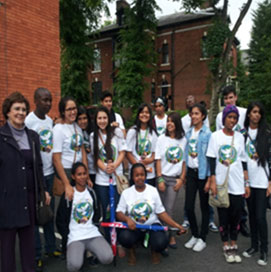
This time Stories from the Field brings the voice of Marlene Silbert, former Education Director of the Cape Town Holocaust Center and official Trained Trainer of the Learning to Live Together Program. Marlene shares how the manual has been used in several programs and thematics in Cape Town ranging from human rights, interfaith and intercultural twining and exchange, and religious diversity. Marlene also shares with us the voices of some of the people who have been involved, including teachers and children, and the impact the programs have had on them.
This experience from Cape Town shows the importance of interfaith and intercultural education programs to bring together people of different beliefs and cultures to work together for peace in post-conflict societies.
“Over the past four years I have used the Learning to Live Together Manual in three programmes I introduced and facilitated, and it has proved to be an indispensible resource. The first of these is a Holocaust and Human Rights Programme, the second, an Interfaith Intercultural Twinning and Exchange Programme, and the third is a Religious Diversity Programme. The concepts of Understanding Self and Others and Transforming the World Together – modules of the Learning to Live Together manual – are basic tenants of each programme and many of the activities in the manual are used during the course of each programme.
The Holocaust and Human Rights programme is designed for high school pupils, educators, university students, members of the civil service and adults from civil society. The methodologies and activities in the manual are easily adapted to meet the needs of each individual group. These programmes focus on building bridges of trust, respecting the dignity of difference, understanding our common humanity, and responding to the needs of others. The Exchange Programme is designed for Grades 10 and 11 pupils from diverse schools. The aims and objectives are to promote respect, harmony, social cohesion, and reconciliation. The pupils engage in meaningful dialogue with peers from different racial, religious, cultural, and socio-economic backgrounds. Through the Learning to Live Together activities they are sensitized to their own prejudices, are able to break down stereotypes, gain a greater understanding of self, and an appreciation of the value of diversity. Every participant has expressed the positive impact the programme has had on them and their determination to work towards the creation of a peaceful and harmonious society. The aim of the Religious Diversity Programme is to help shape the consciousness, understanding and appreciation of religious and cultural diversity, respect the dignity and rights of others, and celebrate the common values that are inherent in all religions.
The Learning to Live Together manual has been endorsed by the Life Orientation Curriculum Advisors in the Western Cape Department of Education and it is now being used throughout the region by many teachers.”
Voices of Teachers
“Learning to Live Together is a manual that is long overdue for South Africans to build a stronger and more peaceful society. I use this book for my Art and Culture lessons as well as in Life Orientation. Teachers in our school have asked to borrow the book. My response: ‘Only 10 minutes and I want my book back!” (Phoenix Secondary School)
“Learning to Live Together is a wonderful resource and can definitely be utilized by our Life Orientation teachers, but also by many other teachers. It is a practical workbook with excellent age appropriate and thought-provoking activities, and the activities encourage our youth to reach out to others of other faiths. Undoubtedly, this Manual enriches the lives of young people.” (South Peninsula High)”
Voices of Children
Interfaith Intercultural Programme
“This incredible programme taught us to think about other religions with respect and understanding. This experience was fantastic, life-changing, and inspiring, and I am forever thankful.”
“Through learning about the similar values in all our religions we are able to practice our religion freely, and at the same time respect all other religions; we are able to conduct debates where both sides respected one another and listened to what each person had to say. We have learnt that we can all contribute towards the creation of a peaceful society and we will endeavour to do so.”
“Before this experience I had barely met anyone of a different religion or culture. This programme broke
down all the stereotypes I had and created unity among our peers. I truly believe this programme will contribute to creating a more peaceful society where diversity is valued. I have learnt that we can all live together peacefully as humans, talk freely about sensitive topics and respect each other’s opinions.”“Going into a mosque and learning about Islam from a Jewish perspective was one of the most incredible and life-changing experiences. It is impossible for me to explain the feeling but so many of my stereotypes were broken down, and so many of my questions were answered.”
“I have learnt not to react badly when people offend you unintentionally because they make uniformed statements. As ambassadors of the interfaith intercultural programme we will respectfully engage with people who are different from ourselves, help each other to become better informed, reconcile grievances and help to create a better world.”